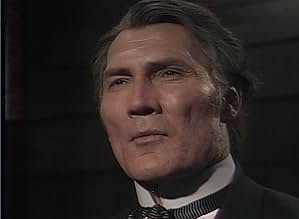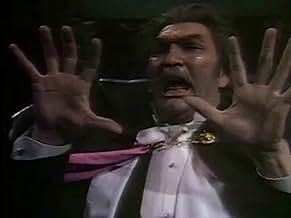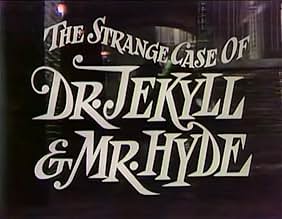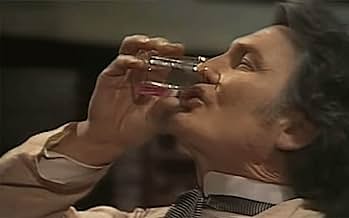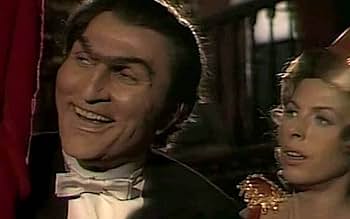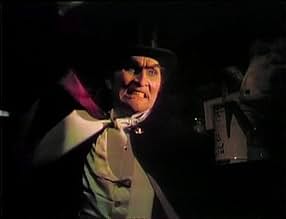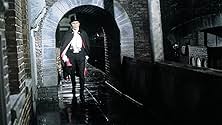Dr Jekyll et Mr Hyde
Titre original : The Strange Case of Dr. Jekyll and Mr. Hyde
NOTE IMDb
6,8/10
825
MA NOTE
Ajouter une intrigue dans votre langueDr. Henry Jekyll experiments with scientific means of revealing the hidden, dark side of man and releases a murderer from within himself.Dr. Henry Jekyll experiments with scientific means of revealing the hidden, dark side of man and releases a murderer from within himself.Dr. Henry Jekyll experiments with scientific means of revealing the hidden, dark side of man and releases a murderer from within himself.
- Réalisation
- Scénario
- Casting principal
- Nommé pour 4 Primetime Emmys
- 1 victoire et 4 nominations au total
Elizabeth Cole
- Hattie
- (as Liz Cole)
Jeanette Landis
- Liz
- (as Jeannette Landis)
Avis à la une
Jack Palance seems made for this role. As the mild mannered Henry Jekyll, Palance is subdued, allowing none of his usual acting intensity to mar the characterization. As Hyde, Palance comes alive as he does in many films, relishing his own evil (Dracula, Barrabas, Scrooge). This film's focus is not on the horrifying transformation from Jekyll to Hyde that you expect to see. In fact, you don't see the first one, and Jekyll only learns about it by people telling him what happened the night before when Hyde appeared.
The makeup for Hyde is not drastically different from Palance's own appearance; he is ugly but not hideous. In fact, he looks, dresses, and behaves like a womanizing Cary Grant on a drunken rampage. He has fun drinking and whoring and giving everyone something to talk about later, but then he begins to take over Jekyll's personality. Denholm Elliot is Devlin, Jekyll's friend and "savior".
I've only seen the Barrymore version in comparison. Barrymore is a much more monstrous Hyde, but both versions are excellent.
The makeup for Hyde is not drastically different from Palance's own appearance; he is ugly but not hideous. In fact, he looks, dresses, and behaves like a womanizing Cary Grant on a drunken rampage. He has fun drinking and whoring and giving everyone something to talk about later, but then he begins to take over Jekyll's personality. Denholm Elliot is Devlin, Jekyll's friend and "savior".
I've only seen the Barrymore version in comparison. Barrymore is a much more monstrous Hyde, but both versions are excellent.
I remember seeing this one split up over two late nights on ABC in the early 1970s. I was mesmerized and excited; I've longed to see the film again and recently got my chance! As soon as I found out it was available on DVD I bought it. Lots to be nostalgic about here: for instance, that wonderful videotape quality of the visuals (even more vivid now that the thing is out on DVD). Jack Palance hams it up as Hyde: a friend who saw the movie with me said he looked like a muppet during the scene at Tessie's music hall! But his Dr. Jekyll is a brilliant character, full of the best kind of noble suffering that a great tragic hero endures. I loved every minute of it. And Robert Cobert's music--all of which was originally used for the great _Dark Shadows_ series--is more haunting than ever. Any fan of _Dark Shadows_ will love this _Jekyll and Hyde_; and any horror fan should enjoy seeing it, too!
Amid the long lists of accomplishments, for actor Jack Palance, is this truly remarkable film achievement. Robert Louis Stevenson created his memorable set of characters; humanitarian Jekyll and terrifying Mr. Hyde, never realizing how many thespians would attempt to personify his creations. On stage and later in Hollywood several actors tried. From the 1930s' to a modern interpretation involving Michael Caine, a dozen actors have attempted the duel parts. Many are consider excellent, but for my money, the very best is none other than Jack Palance as Dr. Henry Jekyll and Mr. Edward Hyde. I suppose its because, Jack Palance throughout his movie career, has established himself as a reputable heavy. No one, including myself, had ever seen him emulate a respectable, sophisticated and admired medical man of science. His performance in this role is nothing short of magical, nay, electrifying. For the first time in film history, has an actor stun the audience with such an incredible performance, as to leave them applauding him with praise and wonderful accolades. To his credit, his fellow actors believed that as well. They included Denholm Elliott as Mr. George Devlin, Leo Genn as Dr. Lanyon, Torin Thatcher as Sir John Turnbull and wonderful Oscar Homolka as Stryker. You may see other film adaptions of this horror tale, but in my opinion, few to equal this version. *****
I saw this movie when it first came out on TV and at least one other time on TV. Seems like it was made for TV by the Canadian Broadcasting Company, as I recall. I had read the book and had seen several movie versions and was delighted at the vigor and believability that Jack Palance brought to the title role(s). As someone else has said here, I think it was the closest rendition of the book as well. He was good as both the good doctor and as Hyde, but was remarkable in bringing Hyde to life without much makeup, rather with the strength of his acting. His physical vigor was a part of it too, dashing through the streets, doing violence with his sword-cane in the action scenes, and I think I remember him leaping across the furniture in a pub in one scene. I'm glad to read here that it is out on DVD and will look forward to seeing it again.
In the late 1960s, Dan Curtis made a name for himself by being the executive producer and writer for "Dark Shadows". In addition, he made a few made for TV horror films--including "Dracula", "The Picture of Dorian Gray" and this film, "The Strange Case of Dr. Jekyll and Mr. Hyde".
One problem with this and all other versions of the story I have seen is that they have the same actor play both Dr. Jekyll AND Mr. Hyde. I say this is a mistake because in Robert Louis Stevenson's novel, the reason why folks could not believe the two men were one was that Hyde was SIGNIFICANTLY shorter than the doctor. In other words, films only use a bit of makeup to make the transformation and the two invariably look too similar to make the story very convincing.
Unlike the movie versions of the story made during the sound era, this one is unusual in that it jumps right into the action. Within a few minutes of the start of the film, Dr. Jekyll has already created his elixir to transform himself into a less restrained persona, Mr. Hyde. His motivations and good works he did before the transformation are really not explored in any depth like other films. I don't think this is a bad thing--just different.
Another thing that was a bit different is that this version is quite a bit more violent than other versions (such as the Frederic March and Spencer Tracy films). Hyde stabs and beats a lot of folks for kicks and seems more nasty than usual. Again, not a bad thing at all--just different. Plus, the awfulness of Hyde is well in keeping with the spirit of the novel.
I think the thing that surprised me the most is that Jack Palance was quite good. He was intense as Hyde and quite restrained as Jekyll. The film also looked exceptional. In particular, the streets of London were quite striking as were the costumes. They got the look down quite well--far better than you'd expect for a made for TV production. As a result, it's about as good a version as you can find--though, as I pointed out above, it sure would be nice to see a version closer to the book in regard to how Hyde looked.
One problem with this and all other versions of the story I have seen is that they have the same actor play both Dr. Jekyll AND Mr. Hyde. I say this is a mistake because in Robert Louis Stevenson's novel, the reason why folks could not believe the two men were one was that Hyde was SIGNIFICANTLY shorter than the doctor. In other words, films only use a bit of makeup to make the transformation and the two invariably look too similar to make the story very convincing.
Unlike the movie versions of the story made during the sound era, this one is unusual in that it jumps right into the action. Within a few minutes of the start of the film, Dr. Jekyll has already created his elixir to transform himself into a less restrained persona, Mr. Hyde. His motivations and good works he did before the transformation are really not explored in any depth like other films. I don't think this is a bad thing--just different.
Another thing that was a bit different is that this version is quite a bit more violent than other versions (such as the Frederic March and Spencer Tracy films). Hyde stabs and beats a lot of folks for kicks and seems more nasty than usual. Again, not a bad thing at all--just different. Plus, the awfulness of Hyde is well in keeping with the spirit of the novel.
I think the thing that surprised me the most is that Jack Palance was quite good. He was intense as Hyde and quite restrained as Jekyll. The film also looked exceptional. In particular, the streets of London were quite striking as were the costumes. They got the look down quite well--far better than you'd expect for a made for TV production. As a result, it's about as good a version as you can find--though, as I pointed out above, it sure would be nice to see a version closer to the book in regard to how Hyde looked.
Le saviez-vous
- AnecdotesThis production originally began shooting with Jason Robards in the title role(s), and a makeup that was heavily influenced by John Barrymore in the 1920 silent version (Le Docteur Jekyll et M. Hyde (1920)). Production was halted due to a strike, and when filming was able to resume, Robards was no longer available. Jack Palance took over the Jekyll/Hyde role, and the makeup concept was radically changed - inspired, more or less, by that of a satyr.
- GaffesWhen Jekyll's friends call on him and he sends them away without seeing them, Jekyll returns to his desk. As the camera follows him, crew can be seen in a reflection of the mirror on the left side of the picture while Jekyll is writing at his desk.
- Citations
Mr. George Devlin: [opening narration] It has been said that many men have found their way through the valley of violence to the palace of wisdom. But if all men must learn wisdom tomorrow from violence today, then who can expect there will be a tomorrow?
Meilleurs choix
Connectez-vous pour évaluer et suivre la liste de favoris afin de recevoir des recommandations personnalisées
Détails
- Date de sortie
- Pays d’origine
- Langue
- Aussi connu sous le nom de
- Dr. Jekyll and Mr. Hyde
- Lieux de tournage
- Distillery District, Toronto, Ontario, Canada(Old London, England)
- Sociétés de production
- Voir plus de crédits d'entreprise sur IMDbPro
Box-office
- Budget
- 900 000 $US (estimé)
Contribuer à cette page
Suggérer une modification ou ajouter du contenu manquant

Lacune principale
By what name was Dr Jekyll et Mr Hyde (1968) officially released in India in English?
Répondre
